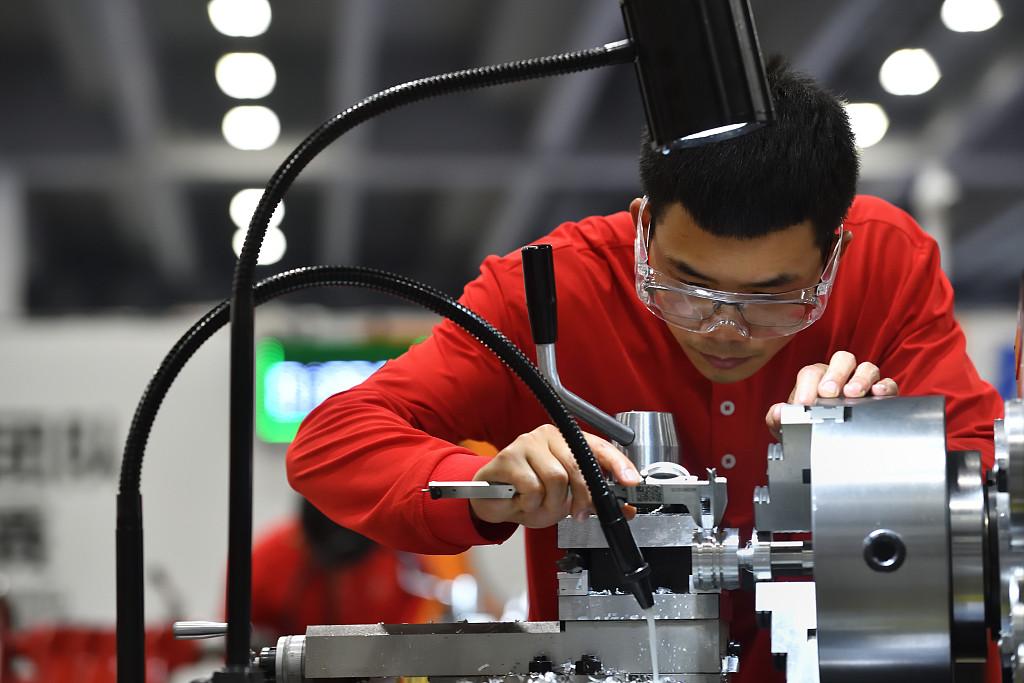What ails vocational education?
 0 Comment(s)
0 Comment(s) Print
Print E-mail chinadaily.com.cn, August 17, 2023
E-mail chinadaily.com.cn, August 17, 2023

Contestants are seen at the first Vocational Skills Competition of China in Guangzhou, Guangdong province, on Dec 11, 2020. [Photo/VCG]
The increasing challenge of college graduates to get a suitable job, and the decreasing value of university degrees have become a matter of concern. Yet vocational education remains underappreciated, with, contrary to expectations, few college graduates turning to vocational institutions for acquire additional skills.
This year, the number of students taking the college entrance examination (or gaokao) has increased by 980,000 to about 12.91 million. Notably, about two-thirds of the students who took the exam from Henan province were from regular high schools, while the rest were from vocational high schools — a major contributor to the increased number of applicants — or were graduates of vocational colleges.
These figures show that while some vocational school graduates have better chances of getting a job or are more skillful in certain fields than their counterparts from conventional universities, the quality of jobs and level of salary they get, as well job stability and career progress are not on par with graduates from conventional universities.
Consequently, a substantial number of vocational school graduates are taking the college entrance exam to sharpen their competitiveness in the job market.
China is seeing an oversupply of university graduates and white-collar professionals, while there is a shortage of skilled technical workers. But it is difficult to change people's traditional mindset of pursuing education to get a bureaucratic or other high-end job. Students with such a mindset are less likely to opt for vocational education and, instead, pursue conventional education.
Also, the disparities between blue-collar and white-collar workers in terms of social welfare, healthcare, societal status and work environment are apparent. The Chinese economy is still largely driven by low-end manufacturing, and jobs for vocational education graduates are often physically demanding and less technologically complex.
As such, a majority of students are not attracted to vocational education. In terms of teaching resources, vocational education, in general, requires a more diverse range of resources and higher costs compared with general education stream. And there is still a significant gap in the resources allocated for general education and vocational education.
To begin with, there is a shortage of funding for vocational education, not to mention the mismatch between the teaching staff and the actual teaching needs. While there is much room for improvement in terms of funding, teaching materials for vocational education need to be categorized and updated. There also a need to modernize the content of professional skill courses.
Vocational education also suffers from a severe lack of specialized teachers and skilled mentors. Many instructors rely on limited teaching methods that focus only on imparting knowledge to the students, which is not advisable for building a highly skilled and advanced workforce.
The teaching environment in vocational high schools and vocational colleges, too, is not conducive to imparting knowledge and skills to students, while the lack of academic vibrancy makes it difficult for students to focus on learning and prevents them from acquiring the needed knowledge and skills, thereby hindering their intellectual growth.
Additionally, since many students entering vocational schools have lower academic starting points, they often develop a negative attitude toward learning. As a result, their self-confidence and motivation are relatively low, and aspirations and expectations limited, resulting in a wide disparity between them and traditional university graduates in terms of employability and pay.
It is therefore clear that despite enhancing students' practical abilities, vocational education still doesn't have a solid foundation, which limits the employability of vocational college graduates.
Graduates of vocational colleges and regular colleges are in an unequal competitive position when it comes to pursuing further education. As for pursuing education throughout one's life, most vocational school graduates find it appealing but inaccessible, because there are many barriers for them on the road to lifelong learning.
Besides, the current limited curriculum for vocational education is not conducive to vocational college graduates to further their lifelong learning process.
In conclusion, to improve vocational education and enhance its appeal, the government, schools, businesses and society as a whole should set specific targets and work together to achieve them. For that, however, measures should be taken to help change people's mindset, and allow vocational education to play an increasingly effective role in people's pursuit of a better life.






Go to Forum >>0 Comment(s)